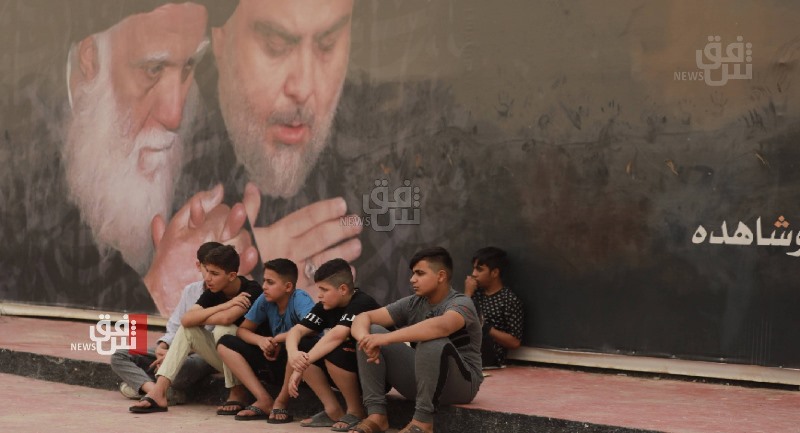politicsCommunist PartyIraq demonstrationsAl-Sadr demonstrationsCoordination framework demonstrations
2022-08-12 06:40A-AA+
Shafaq News / Multi-purpose demonstrations and supporting parties will start on Friday afternoon in the capital, Baghdad, and a number of governorates of the country, amid strict security measures, at a time when the sit-in of supporters of the leader of the Sadrist movement Muqtada al-Sadr enters its third week in a row in Al-Khadra (political decision-making area since system change).
Three areas of the capital, Baghdad, will be the scene of the demonstrations, which in turn will move to the governorates of Basra, Muthanna, Dhi Qar, Maysan, Diwaniyah, Wasit, Babil, in addition to Nineveh, all of which will start at five o’clock this afternoon.
Both the Shiite coordination framework, and the Sadrist movement opposed to it, issued several directives to their supporters in preparation for counter-demonstrations in the central and southern regions of Iraq, against the background of the aggravation of the political crisis, and its access to a closed road in the country.
This is the second counter-demonstrations for which the Shiite poles have mobilized since the Sadrists stormed the Iraqi parliament building, in protest against the nomination of the framework, Muhammad Shiaa al-Sudani, for the position of Prime Minister.
The political scene in Iraq has been going through a dangerous turn since supporters of the Sadrist movement led by prominent Shiite cleric Muqtada al-Sadr stormed the parliament building in the fortified Green Zone in central Baghdad, and staged a sit-in in protest against Al-Sudani’s nomination for the position of head of the next federal government.
Al-Sadr demonstrations
In confirmation of the above, the “minister of the leader” who is close to al-Sadr called, in a post on social media, what he described as “reform lovers” to prepare to “support reform” by gathering in their governorate, at five o’clock in the afternoon on Friday, and not Going home “until further notice”.
He attributed the reasons for the demonstrations, including “to anger the corrupt”, as well as “filling out legal forms to be submitted to the judiciary in order to dissolve parliament” in response to Al-Sadr’s call to the Iraqi Supreme Judicial Council to dissolve parliament.
Frame demonstrations
As for the coordinating framework, it mobilized for demonstrations in Baghdad, specifically the suspension bridge leading to the Green Zone, in addition to demonstrations described as central to the south, with their starting point in Basra, and others for the north, centered in Nineveh, for the purpose of “supporting the law and preserving state institutions,” as he described it.
The organizing committee for the framework demonstrations stated that these demonstrations will start at five o’clock in the afternoon of Friday, which is the same time as the demonstrations on the green walls, from the side of the suspension bridge in the capital, Baghdad.
Communist demonstrations
On a parallel level, the Iraqi Communist Party also called on its supporters to demonstrate in Al-Firdaws Square in the center of the capital, Baghdad, a demonstration that may be less dangerous on the Iraqi scene, given the limited audience and their dwindling in recent years.
The Secretary of the Communist Party, Raed Fahmy, wrote in a tweet on Twitter, “The quota approach and its political system that incubates corruption have brought the political process to a standstill… A comprehensive change towards a state of citizenship has become a necessity.”
He added that this must be “achieved peacefully through dissolving parliament, early elections and forming a transitional government,” explaining that “Friday’s demonstration in Al-Firdaws Square is a meeting place for all who aspire to an Iraq free of quotas, corruption and militias.”
Constitutional obstruction
The political scene is living in a crisis situation and a dead end unprecedented in the history of Iraq, as more than 300 days have passed since the early elections without being able to form a new government in the country, and the survival of the caretaker government headed by Mustafa Al-Kazemi.
On the tenth of last October, Iraq held early legislative elections to get out of a political crisis that swept the country after large demonstrations in the central and southern regions in 2019 in protest against the widespread unemployment in society, the spread of financial and administrative corruption in government departments and institutions, and the deteriorating reality The service and the livelihood, which prompted the former prime minister, Adel Abdul-Mahdi, to resign under popular pressure.
As soon as the preliminary results of the elections were announced, the voices of political forces and actors rose in their rejection of losing many seats, accusing them of major fraud in the ballot, which was denied by the executive and judicial authorities, at a time when the United Nations and international organizations praised the integrity of the electoral process.
https://shafaq.com/ar/%D8%B3%DB%8C%D8%A7%D8%B3%D8%A9/%D8%B5%D8%AE%D8%A8-%D9%81%D9%8A-%D8%A8%D8%BA%D8%AF%D8%A7%D8%AF-%D9%888-%D9%85%D8%AD%D8%A7%D9%81%D8%B8%D8%A7%D8%AA-%D8%AA%D8%B8%D8%A7%D9%87%D8%B1%D8%A7%D8%AA-%D8%AB%D9%84%D8%A7%D8%AB%D9%8A%D8%A9-%D8%A7%D9%84-%D8%A8%D8%B9%D8%A7%D8%AF-%D9%88%D8%A7%D9%84-%D9%85%D9%86-%D9%8A%D8%B4%D8%AF%D8%AF

